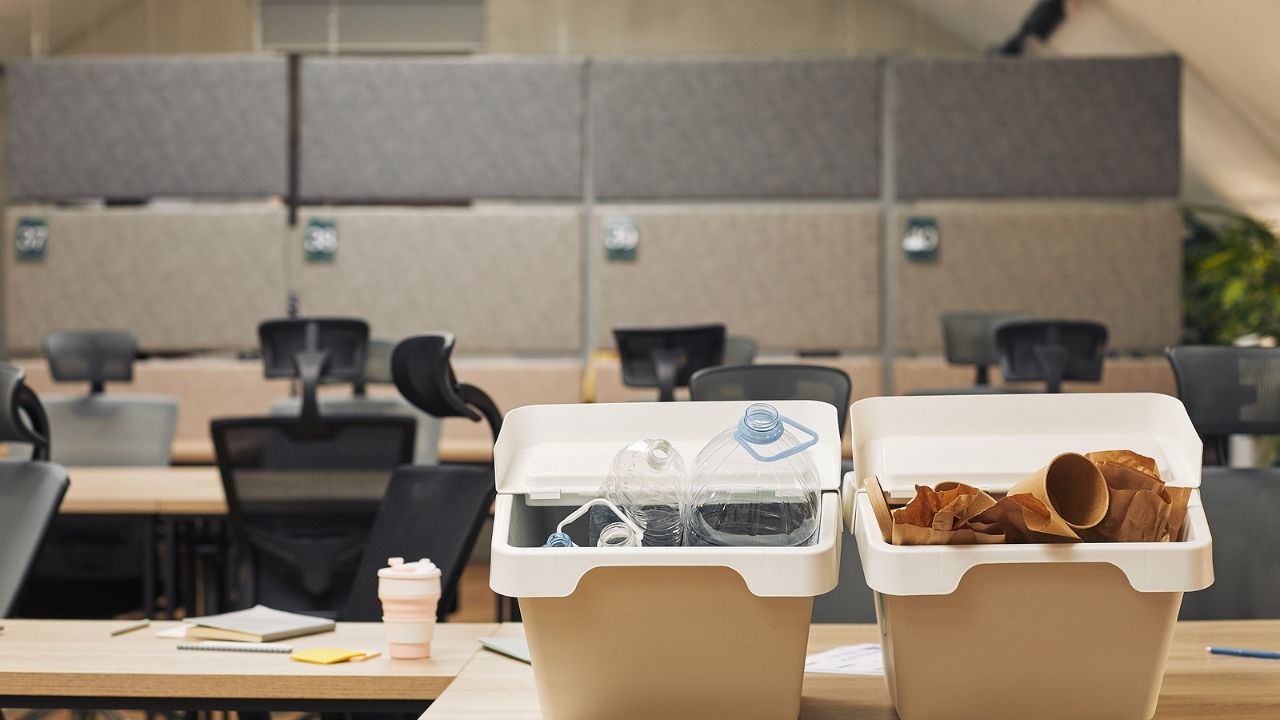- A circular economy follows the reduce, reuse and recycle approach.
- According to the World Resources Institute, 40% of all waste generated can be attributed to buildings.
- If coworking operators retrofit, refurbish or repair existing buildings, this will lead to lower emission facilities, which is less resource-intensive and more cost-effective than demolition and new construction.
The circular economy is becoming an increasingly popular concept around the world.
A circular economy follows the reduce, reuse and recycle approach. Resource use is minimized, reuse of products and parts is maximized, and raw materials are reused to a high standard.
The opposite of a circular economy is a linear economy – which deals with raw materials in an inefficient way, because the emphasis is not on their conservation. Materials are collected, then transformed into products, which are eventually discarded as waste.
While some might say that the linear economy is more profitable compared to the circular economy, experts say that this is not the case. In fact, the circular economy’s prioritization of recycling waste can lead to higher profits, increased competitiveness, more jobs for workers, and more long-term sustainability of businesses.
According to the World Resources Institute, 40% of all waste generated can be attributed to buildings. They also account for 40% of all material resource use by volume.
Repurposing lowers emission facilities
From steel to electricity to concrete, it takes a vast number of resources to build office spaces.
In Europe, construction makes up more than a third of total energy consumption. When buildings reach the end of their lifetime, only 40% of construction waste is recycled or reused.
The pandemic has shown us all that working from home is possible, and it’s now a prominent part of the future of work. Many companies are reducing their real estate footprint and shifting to flex space, or going fully remote, instead.
If workspace owners and operators retrofit, refurbish or repair existing buildings, this will lead to lower emission facilities, which is less resource-intensive and more cost-effective than demolition and new construction. This model fits in with the circular economy, which could help the world recover financially from the pandemic.
The coworking/flexible office space industry is, in fact, a reuse and reduce industry.
At their core, coworking and flexible offices have been a key development within the circular economy. Rather than buying space or leasing large floor offices which may lie vacant, it is far more sustainable for individuals to simply lease spaces with access to services and benefits for as long as they need them.
Shared and service use models need to gain popularity over the ownership model for the world to make the transition to the circular economy.
Designing a circular office space is also an option.
In 2011, a case study by the Waste and Resources Action Program found that 14% of office furniture was reused in the U.K. in one year, and an estimated nine million pounds is spent on disposing of desks to landfills.
One way to combat that kind of waste is through modular furnishings that can be reused or refurbished to meet the needs of the user. In the new post-pandemic environment, modular systems offer another big advantage: quick customizations.
For larger projects where the circular economy is taken into account, building designs can be altered in support of the circular economy goal.
Buildings can be modified to allow for a lot of sunlight to enter the building, as well as better ventilation. A building’s core can be designed to be disassembled and flexible, and an office building can be turned into a coworking space – or even housing, so it never ceases to be without a function.
The construction sector has been known as one of the three sectors with high potential to implement circular economy strategies, particularly through the adoption of eco-friendly products and technologies.
If the construction/building industry adopted circular economy principles and promoted the use of sustainable materials, this would maximize material recovery, and avoid unnecessary waste generation and waste disposed to landfill.
By applying principles of the circular economy in the European built environment, it is possible to save €350 billion through resource and energy savings by 2030, according to a Science Direct journal.
It’s estimated that adopting circular thinking in construction could reduce global carbon emissions by 38% by 2050.
Consumers value the circular economy
DNV’s consumer survey on the circular economy shows that while companies may be pushed into adopting new business models by regulators and initiatives, such as the EU Circular economy action plan, consumers tend to have more freedom in determining their own actions.
Almost all respondents think consumers can play a role in the circular economy (86.1%). Interestingly, 20.7% believe boycotts and advocacy can work, which could represent a risk for companies that do not improve and communicate their contribution to circularity.
Respondents in this survey were mostly receptive to circular economy models, which is a positive aspect that companies or coworking spaces should capitalize on. In fact, 43% of consumers express a personal interest in the circular economy.

 Dr. Gleb Tsipursky – The Office Whisperer
Dr. Gleb Tsipursky – The Office Whisperer Cat Johnson – Coworking Marketing Maven
Cat Johnson – Coworking Marketing Maven Angela Howard – Culture Expert
Angela Howard – Culture Expert Drew Jones – Design & Innovation
Drew Jones – Design & Innovation Andrea Pirrotti-Dranchak – Competitive Advantage
Andrea Pirrotti-Dranchak – Competitive Advantage Jonathan Price – CRE & Flex Expert
Jonathan Price – CRE & Flex Expert Jeremy Fennema – Tech Innovation Alchemist
Jeremy Fennema – Tech Innovation Alchemist







